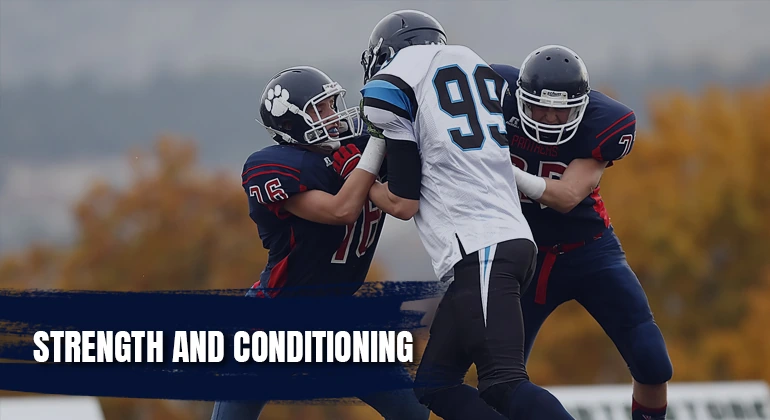
American football is a game that requires a unique blend of athleticism, strategy, and skill. Whether you're a beginner or a seasoned player, there's always room for improvement when it comes to your performance on the field. That's why training is so essential to success in this sport. But what kind of training is most effective? And how can you ensure that you're getting the most out of your workouts?
In this post, we'll explore some of the top tips and techniques for American football training. We'll cover everything from strength and conditioning to agility drills and play analysis. You'll learn about the importance of building a strong foundation of basic skills, such as tackling and ball handling, as well as more advanced techniques like route running and pass rushing. And we'll discuss how to tailor your training regimen to your specific position on the field, whether you're a quarterback, a linebacker, or a wide receiver.
So whether you're looking to take your game to the next level or just want to improve your overall fitness, this post is for you. Let's dive in and discover what it takes to be a successful American football player.
Read about: Discover Khalil Mack Workout for Building Strength
Importance of Training for American Football Players
Training is an essential component for any athlete looking to excel in their sport, and American football is no exception. Football is a physically demanding sport that requires strength, speed, agility, and endurance, as well as technical skills like passing, tackling, and blocking. Training helps players to develop these skills, build their physical fitness, and improve their overall performance on the field.
One of the main benefits of training for American football players is injury prevention. Football is a contact sport, and players are at risk of getting injured during games and practices. Training helps to strengthen the muscles, bones, and joints, which can reduce the risk of injury. Additionally, training can improve flexibility and mobility, making it easier for players to move around the field and avoid collisions.
Training also helps to build stamina and endurance, which are crucial for football players who need to perform at a high level for extended periods of time. Conditioning workouts like sprints, interval training, and plyometrics can help players to improve their cardiovascular fitness and build endurance, allowing them to maintain their speed and agility throughout the game.
Furthermore, training can help players to develop technical skills, like passing, catching, and tackling. By practicing these skills through drills and repetition, players can improve their technique and reduce errors during games. Position-specific training can also help players to master the skills necessary for their specific position on the field, such as quarterback, running back, or lineman.
Overall, training is an integral part of American football, and it can help players to improve their performance, prevent injuries, and build their physical fitness. With a well-designed training program and dedication to regular workouts, football players can take their game to the next level and achieve their goals on the field.
Basic Skills Training
Basic skills training is a fundamental aspect of American football training that every player should focus on to improve their overall performance. Basic skills training covers the fundamental techniques required for the game, such as tackling, ball handling, and blocking. By mastering these skills, players can build a strong foundation to perform more complex maneuvers and techniques.
Tackling is a critical skill that requires proper technique and timing to execute effectively. Players should focus on maintaining a low center of gravity, keeping their head up, and driving their shoulder into the ball carrier's midsection to bring them down. Coaches can use tackling drills that focus on technique, like the form tackle or the rugby-style tackle, to help players improve their tackling skills.
Ball handling is another critical skill that requires good technique and control. Players should focus on proper hand placement, grip, and ball security. Ball handling drills can help players improve their ball control skills, such as the two-hand grip drill, the one-hand grip drill, and the ball security drill.
Blocking is another essential skill that players must master. Effective blocking requires good footwork, balance, and positioning. Players should focus on keeping their feet shoulder-width apart, keeping their knees bent, and maintaining a solid base. Blocking drills, such as the sled drill and the blocking pad drill, can help players improve their blocking skills.
Strength and Conditioning

Strength and conditioning are crucial components of American football training that help players to develop the power, speed, and endurance required to excel on the field. Football is a physically demanding sport that requires players to be strong, explosive, and agile, and strength and conditioning workouts can help players to develop these attributes.
Strength training involves exercises that target the muscles, bones, and joints, with the goal of increasing strength and power. Weightlifting exercises like squats, deadlifts, and bench press can help players to build muscle mass and improve their overall strength. Plyometric exercises like box jumps and explosive push-ups can help players to develop explosive power and speed.
Conditioning training is focused on improving cardiovascular fitness and endurance. Interval training, sprints, and circuit training are popular conditioning workouts that can help players to improve their endurance, speed, and agility. By incorporating conditioning workouts into their training regimen, players can build their stamina and maintain their peak performance throughout the game.
A well-designed strength and conditioning program can help players to prevent injuries and recover faster from injuries. Building strength in the muscles and joints can help to reduce the risk of injuries, and proper conditioning can help players to recover faster from injuries and return to the game more quickly.
Agility and Speed Training
Agility and speed training are essential components of American football training that can help players to improve their footwork, quickness, and overall performance on the field. Football requires players to be able to change direction quickly, accelerate rapidly, and decelerate suddenly, and agility and speed training can help players to develop these skills.
Agility training involves exercises that improve a player's ability to change direction quickly and move laterally. Ladder drills, cone drills, and shuttle runs are popular agility drills that can help players to improve their footwork and quickness. By incorporating agility drills into their training regimen, players can develop the ability to change direction quickly and react to sudden movements on the field.
Speed training focuses on improving a player's ability to accelerate and maintain top speed over a distance. Sprinting drills, resistance training, and plyometrics are popular speed training workouts that can help players to improve their sprinting technique and speed. By incorporating speed training into their regimen, players can improve their overall speed and explosiveness, making them more effective on the field.
Agility and speed training can also help players to improve their reaction time and coordination. By improving their ability to move quickly and react to sudden changes, players can better avoid tackles, make quick cuts, and evade defenders.
Position-Specific Training
Position-specific training is an essential component of American football training that focuses on developing the skills and techniques required for a player's specific position on the field. Each position requires a unique set of skills, and position-specific training can help players to develop the skills necessary to excel in their position.
Quarterbacks require a combination of technical skills and mental agility. Quarterback training focuses on improving throwing accuracy, footwork, and decision-making. Drills like the throwing drill and the turnibol pocket movement drill can help quarterbacks improve their throwing accuracy and footwork, while film analysis can help them to make better decisions on the field.
Running backs require explosive power and quickness. Running back training focuses on improving agility, footwork, and ball handling. Drills like the cutback drill and the agility ladder drill can help running backs to improve their footwork and agility, while ball security drills can help them to improve their ball handling skills.
Receivers require speed, agility, and strong hands. Receiver training focuses on improving route running, catching ability, and footwork. Drills like the cone drill and the catching drill can help receivers to improve their route running and catching ability, while footwork drills can help them to improve their agility and quickness.
Linemen require strength and technique. Lineman training focuses on improving blocking and tackling technique, as well as developing strength and power. Drills like the sled drill and the blocking pad drill can help linemen to improve their blocking and tackling technique, while weightlifting exercises can help them to build strength and power.
Play Analysis
Play analysis is an important component of American football workout that involves studying game footage to identify areas for improvement and develop better strategies. By analyzing past games, players and coaches can learn from their mistakes and successes, and adjust their approach to improve their performance on the field.
One of the main benefits of play analysis is that it allows players and coaches to identify trends and patterns in their opponents' play. By studying the strategies and tactics of other teams, players and coaches can develop counter strategies that give their team a competitive edge. Play analysis can also help teams to identify weaknesses in their own performance and develop strategies to overcome them.
Play analysis can also help players to improve their individual skills and techniques. By reviewing footage of their own performance, players can identify areas for improvement and work on developing their skills. For example, a quarterback might analyze footage of their throws to identify any flaws in their technique, or a linebacker might review footage of their tackles to identify any areas where they need to improve their form.
Mental Training

Mental training is an important component of American football workout that focuses on improving a player's mental toughness, focus, and confidence. Football is a physically demanding sport that requires a high level of mental toughness to overcome challenges and perform at a high level. Mental training can help players to develop the mental skills necessary to succeed on the field.
One of the main benefits of mental training is that it can help players to improve their focus and concentration. By practicing techniques like visualization and meditation, players can learn to tune out distractions and stay focused on the task at hand. This can be particularly important during high-pressure situations like a game-winning drive or a crucial play.
Mental training can also help players to develop their confidence and mental toughness. By practicing positive self-talk and visualization, players can build their confidence and develop the mental resilience necessary to overcome adversity. This can be particularly important during a game where players are faced with challenges like turnovers, injuries, or mistakes.
Mental training can also help players to develop their ability to handle pressure. By practicing techniques like deep breathing and mindfulness, players can learn to stay calm and composed under pressure. This can be particularly important during high-pressure situations like a crucial field goal or a game-deciding drive.
Finally, mental training can help players to develop better teamwork and communication skills. By practicing visualization and mental rehearsals, players can improve their ability to communicate effectively and work together as a team. This can be particularly important during a game where communication and teamwork are essential for success.
Nutrition and Recovery
Nutrition and recovery are essential components of American football training that can help players to maintain their physical fitness, prevent injuries, and perform at a high level on the field. Football is a physically demanding sport that requires players to be in top physical shape, and proper nutrition and recovery are critical for achieving this.
One of the main benefits of nutrition is that it provides players with the energy and nutrients they need to perform at a high level. Players should focus on eating a balanced diet that includes plenty of lean protein, whole grains, fruits, and vegetables. Proper hydration is also crucial for maintaining optimal performance, and players should aim to drink plenty of water before, during, and after workouts and games.
Recovery is also important for preventing injuries and promoting optimal performance. Proper rest and recovery can help players to prevent fatigue and reduce the risk of injuries. Stretching, foam rolling, and massage can help players to reduce muscle soreness and prevent injuries. Adequate sleep is also essential for recovery and can help players to maintain their physical and mental health.
Nutrition and recovery can also help players to improve their mental and emotional well-being. Eating a healthy diet and getting enough rest can improve mood and reduce stress, which can help players to perform better on the field. Adequate sleep can also help players to maintain their mental sharpness and focus, which can be crucial during high-pressure situations.
Conclusion
In conclusion, American football workout is a complex and demanding process that requires a comprehensive approach. To succeed in the sport, players must focus on developing their physical and mental attributes, including strength, speed, agility, endurance, mental toughness, and focus. Training programs should be tailored to individual players' needs, and should include a combination of basic skills training, strength and conditioning, agility and speed training, position-specific training, play analysis, and mental training.
In addition to physical training, nutrition and recovery are essential components of American football training that can help players to maintain their physical and mental health, prevent injuries, and perform at a high level on the field. Eating a healthy diet, staying properly hydrated, and getting enough rest and recovery time are all critical for maintaining optimal performance and achieving success in the sport.
By focusing on a comprehensive approach to training that incorporates both physical and mental training techniques, players can become more effective on the field and achieve their full potential. Coaches and trainers play a critical role in developing effective training programs that are tailored to individual players' needs, and in providing support and guidance to help players achieve their goals. With dedication, hard work, and the right training, American football players can achieve success both on and off the field.